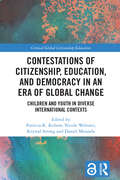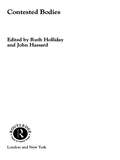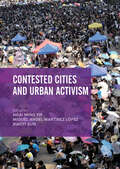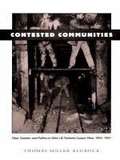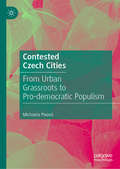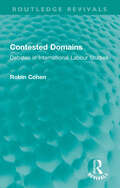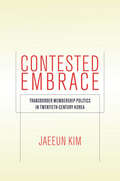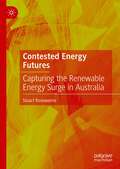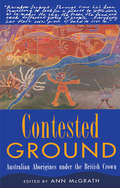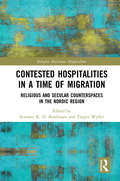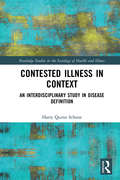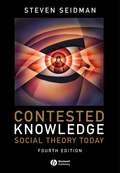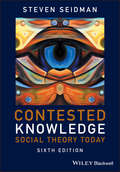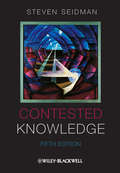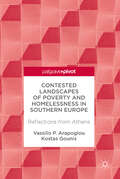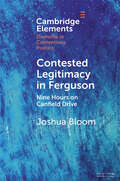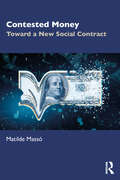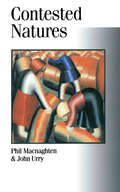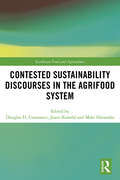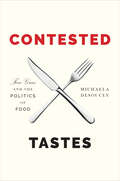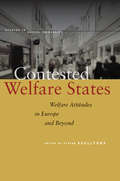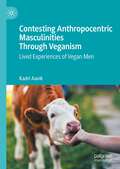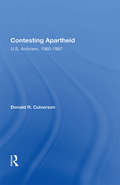- Table View
- List View
Contestations of Citizenship, Education, and Democracy in an Era of Global Change: Children and Youth in Diverse International Contexts (Critical Global Citizenship Education)
by Daniel Miranda Patricia K. Kubow Nicole Webster Krystal StrongContestations of Citizenship, Education, and Democracy in an Era of Global Change: Children and Youth in Diverse International Contexts considers the shifting social, political, economic, and educational structures shaping contemporary experiences, understandings, and practices of citizenship among children and youth in diverse international contexts. As such, this edited volume examines the meaning of citizenship in an era defined by monumental global change. Chapters from across both the Global South and Global North consider emerging formations of citizenship and citizen identities among children and youth in formal and non-formal education contexts, as well as the social and civic imaginaries and practices to which children and youth engage, both in and outside of schools. Rich empirical contributions from an international team of contributors call attention to the social, political, economic, and educational structures shaping the ways young people view citizenship and highlight the social and political agency of children and youth amidst increasing issues of polarization, climate change, conflict, migration, extremism, and authoritarianism. The volume ultimately identifies emergent forms of citizenship developing in formal and non-formal educational contexts, including those that unsettle the nation-state and democracy. Edited by a team of academics with backgrounds in education, citizenship, and youth studies, this book will appeal to scholars, researchers, and faculty who work across the broader field of youth civic engagement and democracy, well as international and comparative education and citizenship.
Contested Bodies
by John Hassard Ruth HollidayThe body occupies a prime position in contemporary theoretical work, yet still there is no consensus on exactly what it is and what constitutes it. Contested Bodies brings together a number of different accounts and perspectives on the body, drawing out some of the key connections and disjunctures from this most contested of topics. This volume features fresh and fascinating contributions from some of the leading thinkers and upcoming theorists in the field. Themes that run through the work include: * the place of the body in theory* the notion of labour in the production of bodies * the transformative potential of bodies on spaces. Grounded in real life experience and examples, this key text will be a valuable reference for undergraduates of sociology and gender studies.
Contested Cities and Urban Activism (The Contemporary City)
by Ngai Ming Yip Miguel Angel Martínez López Xiaoyi SunThis edited volume advances our understanding of urban activism beyond the social movement theorization dominated by thesis of political opportunity structure and resource mobilization, as well as by research based on experience from the global north. Covering a diversity of urban actions from a broad range of countries in both hemispheres as well as the global north and global south, this unique collection notably focuses on non-institutionalised or localised urban actions that have the potential to bring about radical structural transformation of the urban system and also addresses actions in authoritarian regimes that are too sensitive to call themselves “movement”. It addresses localized issues cut off from international movements such as collective consumption issues, like clean water, basic shelter, actions against displacement or proper venues for street vendors, and argues that the integration of the actions in cities in the global south with the specificity of their local social and political environment is as pivotal as their connection with global movement networks or international NGOs. A key read for researchers and policy makers cutting across the fields of urban sociology, political science, public policy, geography, regional studies and housing studies, this text provides an interdisciplinary and international perspective on 21st century urban activism in the global north and south.
Contested Commemorations
by Benjamin ZiemannThis innovative study of remembrance in Weimar Germany analyses how experiences and memories of the Great War were transformed along political lines after 1918. Examining the symbolism, language and performative power of public commemoration, Benjamin Ziemann reveals how individual recollections fed into the public narrative of the experience of war. Challenging conventional wisdom that nationalist narratives dominated commemoration, this book demonstrates that Social Democrat war veterans participated in the commemoration of the war at all levels: supporting the 'no more war' movement, mourning the fallen at war memorials and demanding a politics of international solidarity. It describes how the moderate Socialist Left related the legitimacy of the Republic to their experiences in the Imperial army and acknowledged the military defeat of 1918 as a moment of liberation. This is the first comprehensive analysis of war remembrances in post-war Germany and a radical reassessment of the democratic potential of the Weimar Republic.
Contested Communities: Class, Gender, and Politics in Chile’s El Teniente Copper Mine, 1904-1951
by Thomas Miller KlubockIn Contested Communities Thomas Miller Klubock analyzes the experiences of the El Teniente copper miners during the first fifty years of the twentieth century. Describing the everyday life and culture of the mining community, its impact on Chilean politics and national events, and the sense of self and identity working-class men and women developed in the foreign-owned enclave, Klubock provides important insights into the cultural and social history of Chile. Klubock shows how a militant working-class community was established through the interplay between capitalist development, state formation, and the ideologies of gender. In describing how the North American copper company attempted to reconfigure and reform the work and social-cultural lives of men and women who migrated to the mine, Klubock demonstrates how struggles between labor and capital took place on a gendered field of power and reconstituted social constructions of masculinity and femininity. As a result, Contested Communities describes more accurately than any previous study the nature of grassroots labor militancy, working-class culture, and everyday politics of gender relations during crucial years of the Chilean Popular Front in the 1930s and 1940s.
Contested Czech Cities: From Urban Grassroots to Pro-democratic Populism
by Michaela PixováThis book focuses on urban grassroots movements in post-socialist Czechia and their struggle against unprofessional and nondemocratic urban processes in their cities. It shows that in the context of neoliberal urban restructuring, weakly consolidated democracy, and corporate capture of the local state, urban activists often resort to entering electoral competition as the only efficient way of improving the situation in their cities. The book is based on four case studies from different Czech cities, narrating stories of activists struggling against a controversial flood protection project, the demolition of public buildings, an unhealthy land-use plan, arrogant development, and overpriced city halls. It offers valuable insight into the obstacles created by institutionalized forms of power abuse which urban activists must deal with and discusses the pro-democratic potential of urban grassroot movements’ efforts to overcome their limited ability to influence political processes via standard means of civic engagement and protest activities.
Contested Domains: Debates in International Labour Studies
by Robin CohenOriginally published in 1991, this volume discusses the urban working class, international migrants and the so-called lumpenproletariat. The book exhibits the fruitful interaction that has taken place between sociological theory, new views of the changing world economy and the empirical realities of working class experience and struggles. The dual theme of the book is the control which the state and employers seek to impose and maintain over labouring people, and the resistance put up by workers to these often new and unacceptable disciplines. With case studies – both historical and contemporary – drawn from North America, Britain and various parts of Africa, the author develops an interlocking theory of habituation and resistance. Against the background of profound changes in the global economy, Robin Cohen explores ways in which labouring people respond to the structural and managerial constrains on the development of their class consciousness and self-organisation. This will be of interest to urban and industrial sociologists, as well as those concerned with comparative social theory and the relationship between developing world and industrialised societies.
Contested Embrace: Transborder Membership Politics in Twentieth-Century Korea
by Jaeeun KimScholars have long examined the relationship between nation-states and their "internal others," such as immigrants and ethno-racial minorities. Contested Embrace shifts the analytic focus to explore how a state relates to people it views as "external members" such as emigrants and diasporas. Specifically, Jaeeun Kim analyzes disputes over the belonging of Koreans in Japan and China, focusing on their contested relationship with the colonial and postcolonial states in the Korean peninsula. Extending the constructivist approach to nationalisms and the culturalist view of the modern state to a transnational context, Contested Embrace illuminates the political and bureaucratic construction of ethno-national populations beyond the territorial boundary of the state. Through a comparative analysis of transborder membership politics in the colonial, Cold War, and post-Cold War periods, the book shows how the configuration of geopolitics, bureaucratic techniques, and actors' agency shapes the making, unmaking, and remaking of transborder ties. Kim demonstrates that being a "homeland" state or a member of the "transborder nation" is a precarious, arduous, and revocable political achievement.
Contested Energy Futures: Capturing the Renewable Energy Surge in Australia
by Stuart RosewarneThis book unpacks the politics of climate change in Australia in the context of successive conservative Coalition governments resisting any moves to mitigate emissions and as local communities and transnational corporations struggle with each other to control the transition to a sustainable energy future. As Australia has abundant clean energy resources in terms of solar and wind, the book offers a test case for study of the energy policy transition in the 21st century. It does so by using tools from political economy and sociology, teasing out public attitudes to renewable energy technologies and innovative infrastructure investments, unpacking the complex parameters of this historical debate, tracing the rise of household 'prosumers' and arguing the case for grassroots ownership of renewable infrastructure or 'energy sovereignty' - already pioneered by some isolated communities in Australia. The cultural and emancipatory benefits of cooperative ventures are well known. However, capitalism is not readily defeated by democracy. The promotion of individual households as 'virtual power stations', of 'smart technologies' and even of cryptocurrency into the energy transition innovative mix opens up ever new horizons for corporate control.
Contested Ground: Australian Aborigines under the British Crown
by Ann McGrathContested Ground provides a comprehensive and up to date account of the processes and experiences which shaped the lives of Aboriginal Australians from 1788 to the present.It integrates eye-witness accounts, oral histories and historical research to present the first colony-by-colony, state by state history of Aboriginal-white relations. Contested Ground tells a story of dispossession and denial but it is also a positive account, revealing the persistent struggles of Aboriginal communities for a better future.Clearly written and generously illustrated, this book demonstrates why Australian Aboriginal history, like the very land itself, remains contested ground.'Both indigenous and non-indigenous Australians have a lot to learn about each other before reconciliation between the two peoples can be realised. This book will go a long way towards achieving that end.' - Paul Behrendt.
Contested Hospitalities in a Time of Migration: Religious and Secular Counterspaces in the Nordic Region (Religion, Resistance, Hospitalities)
by Synnøve K. N. Bendixsen Trygve WyllerThis book explores the duality of openness and restriction in approaches to migrants in the Nordic countries. As borders have become less permeable to non-Europeans, it presents research on civil society practices that oppose the existing border regimes and examine the values that they express. The volume offers case studies from across the region that demonstrate opposition to increasingly restricted borders and which seek to offer hospitality to migrant. One topic is whether these practices impact and transform the Nordic Protestant trajectory. The book considers whether such actions are indicative of new sensibilities and values in which traditional categories and binaries are becoming less relevant. It also discusses what these practices of hospitality indicate about the changing relationship between voluntary organizations and the Nordic welfare states in the time of migration. As such, it will appeal to scholars of sociology, anthropology, and religious studies with interests in migration, civil society resistance and social values.
Contested Illness in Context: An Interdisciplinary Study in Disease Definition
by Harry Quinn SchoneWhat makes a disease real? Why is it that patients with chronic fatigue syndrome or fibromyalgia are doubted when they say they are in pain, and cannot access the same benefits of patient-hood that others can? What defines the limits of our belief and, ultimately, compassion, when it comes to disease? These are the questions approached in this book, which draws upon patients’ experiences and situates them among a diverse set of literatures, from the history and philosophy of medicine to the sociology of health and disease. The question of a patient’s identity and their understanding of disease is often assumed to emerge from their relationship with healthcare, but the case is made here that other, inter-personal factors are more salient. What a patient with a contested illness comes up against is not simply a medical categorisation – it is a prevailing notion of disease across society, and one they struggle to assimilate themselves into. Contested Illness in Context will appeal to students and researchers interested in fields such as the history and philosophy of medicine, the sociology of health and illness, medical anthropology, or disease and illness generally. It may also interest patients and doctors who struggle with difficult medical cases.
Contested Knowledge: Social Theory Today
by Steven SeidmanContested Knowledge is a well-established text offering up-to-date perspectives on social theory by one of the most important thinkers of our time. This fourth edition includes an exploration of globalization and a new section on the theories of global and world order. It provides a thoughtful and rigorous, yet highly accessible and reader-friendly account of social theory. Responds to current issues, debates, and new social movements Reviews sociological theory from a truly contemporary perspective Examines both classical and contemporary theories Combines social analysis and moral advocacy to demonstrate how social theory contributes to the making of a better world Challenges social scientists to renew their commitment to the important moral and political role social knowledge plays in public life A thoughtful and rigorous, yet highly accessible and reader-friendly account of social theory An accompanying website containing additional support for lecturers and students is available at www.blackwellpublishing.com/seidman
Contested Knowledge: Social Theory Today
by Steven SeidmanIn the sixth edition of Contested Knowledge, social theorist Steven Seidman presents the latest topics in social theory and addresses the current shift of 'universalist theorists' to networks of clustered debates. Responds to current issues, debates, and new social movements Reviews sociological theory from a contemporary perspective Reveals how the universal theorist and the era of rival schools has been replaced by networks of clustered debates that are relatively 'autonomous' and interdisciplinary Features updates and in-depth discussions of the newest clustered debates in social theory—intimacy, postcolonial nationalism, and the concept of 'the other' Challenges social scientists to renew their commitment to the important moral and political role social knowledge plays in public life
Contested Knowledge: Social Theory Today
by Steven SeidmanIn the fifth edition Contested Knowledge, social theorist Steven Seidman presents the latest topics in social theory and addresses the current shift of 'universalist theorists' to networks of clustered debates. Responds to current issues, debates, and new social movements Reviews sociological theory from a contemporary perspective Reveals how the universal theorist and the era of rival schools has been replaced by networks of clustered debates that are relatively 'autonomous' and interdisciplinary Features updates and in-depth discussions of the newest clustered debates in social theory—intimacy, postcolonial nationalism, and the concept of 'the other' Challenges social scientists to renew their commitment to the important moral and political role social knowledge plays in public life Accompanied by a companion website for students at www.wiley.com/go/seidman featuring chapter outlines and useful web links; an instructor site can also be accessed which features password-protected PowerPoint teaching slides
Contested Landscapes of Poverty and Homelessness In Southern Europe: Reflections from Athens
by Vassilis P. Arapoglou Kostas GounisThe book uses Athens as a case study to identify the key features of urban anti-poverty policies in Greece and to discuss them in relation to policy developments in the crisis-ridden countries of Southern Europe. The idea of contested landscapes shapes the focus of the book on urban poverty and homelessness. Contested landscapes refer to the complex dynamics between visible and invisible poverty and to competing strategies on how to address them. The book takes a path-dependent view on the development of post-welfare arrangements, devolution, and pluralism that are being shaped by both neoliberal mentality, solidarity and communitarian practices. The authors draw on their own research and advocacy background in New York and Athens to shape their conceptual and methodological tools; however, rather than uncritically 'importing' North American and North European concepts to Greece, the book highlights the significance of distinctive Mediterranean features for analysing homelessness and anti-poverty policies. This will be a useful read for academics policy makers in areas of urban studies, sociology, social policy, human geography and anthropology.
Contested Learning in Welfare Work
by Peter H. SawchukDrawing on the field of cultural historical psychology and the sociologies of skill and labour process, Contested Learning in Welfare Work offers a detailed account of the learning lives of state welfare workers in Canada as they cope, accommodate, resist and flounder in times of heightened austerity. Documented through in-depth qualitative and quantitative analysis, Peter Sawchuk shows how the labour process changes workers, and how workers change the labour process, under the pressures of intensified economic conditions, new technologies, changing relations of space and time, and a high-tech version of Taylorism. Sawchuk traces these experiences over a seven-year period that includes major work reorganisation and the recent economic downturn. His analysis examines the dynamics between notions of de-skilling, re-skilling and up-skilling, as workers negotiate occupational learning and changing identities.
Contested Legitimacy in Ferguson: Nine Hours on Canfield Drive (Elements in Contentious Politics)
by Joshua BloomContested Money: Toward a New Social Contract
by Matilde MassóDiscussing money is always accompanied by controversy as well as enchantment. Debating what money is and how it performs its main functions in the contemporary economy is fundamental to understanding the social consequences of money transformation associated with the digital revolution. This book explores the links between the current and prospective properties of money, its production, and its relationship to the concepts of value, the common good, and innovation. Contested Money opens a debate on the role that money could play in a different paradigm based on a renewed conception of monetary properties and functions that are capable of having a positive impact on social and individual welfare. Massó outlines the fundamentals of this monetary model, which would operate as a parallel currency, where the processes of monetary and value creation are connected in a new deal between the citizen and the state, grounded on an approach of reciprocal rights and responsibilities. This book will appeal to scholars, students, and, more broadly, readers interested in a contemporary understanding of what money is, how it is being transformed, and the role that it can play in redefining the twenty-first-century social contract.
Contested Natures (Published in association with Theory, Culture & Society #54)
by John Urry Phil MacnaghtenDemonstrating that all notions of nature are inextricably entangled in different forms of social life, the text elaborates the many ways in which the apparently natural world has been produced from within particular social practices. These are analyzed in terms of different senses, different times and the production of distinct spaces, including the local, the national and the global. The authors emphasize the importance of cultural understandings of the physical world, highlighting the ways in which these have been routinely misunderstood by academic and policy discourses. They show that popular conceptions of, and attitudes to, nature are often contradictory and that there are no simple ways of prevailing upon people to `save the environment′.
Contested Sustainability Discourses in the Agrifood System (Earthscan Food and Agriculture)
by Douglas H. Constance Jason T. Konefal Maki HatanakaThe industrial agrifood system is in crisis regarding its negative ecological, economic, and social externalities: it is unsustainable on all dimensions. This book documents and engages competing visions and contested discourses of agrifood sustainability. Using an incremental/reformist to transformation/radical continuum framework for alternative agrifood movements, this book identifies tensions between competing discourses that stress food sovereignty, social justice, and fair trade and those that emphasize food security, efficiency and free trade. In particular, it highlights the role that governance processes play in sustainability transitions and the ways that power and politics affect sustainability visions and discourses. The book includes chapters that review sustainability discourses at the macro and meso levels, as well as case studies from Africa, Australia, Canada, Europe, South America and the USA.
Contested Tastes: Foie Gras and the Politics of Food
by Michaela DesouceyWho cares about foie gras? As it turns out, many do. In the last decade, this French delicacy--the fattened liver of ducks or geese that have been force-fed through a tube--has been at the center of contentious battles between animal rights activists, artisanal farmers, industry groups, politicians, chefs, and foodies. In Contested Tastes, Michaela DeSoucey takes us to farms, restaurants, protests, and political hearings in both the United States and France to reveal why people care so passionately about foie gras--and why we should care too.Bringing together fieldwork, interviews, and materials from archives and the media on both sides of the Atlantic, DeSoucey offers a compelling look at the moral arguments and provocative actions of pro- and anti-foie gras forces. She combines personal stories with fair-minded analysis of the social contexts within which foie gras is loved and loathed. From the barns of rural southwest France and the headquarters of the European Union in Brussels, to exclusive New York City kitchens and the government offices of Chicago, DeSoucey demonstrates that the debates over foie gras involve heated and controversial politics. Her rich and nuanced account draws our attention to the cultural dynamics of markets, the multivocal nature of "gastropolitics," and the complexities of what it means to identify as a "moral" eater in today's food world.Investigating the causes and consequences of the foie gras wars, Contested Tastes illuminates the social significance of food and taste in the twenty-first century.
Contested Welfare States: Welfare Attitudes in Europe and Beyond
by Stefan SvallforsThe welfare state is a trademark of the European social model. An extensive set of social and institutional actors provides protection against common risks, offering economic support in periods of hardship and ensuring access to care and services. Welfare policies define a set of social rights and address common vulnerabilities to protect citizens from market uncertainties. But over recent decades, European welfare states have undergone profound restructuring and recalibration. This book analyzes people's attitudes toward welfare policies across Europe, and offers a novel comparison with the United States. Occupied with normative orientations toward the redistribution of resources and public policies aimed at ameliorating adverse conditions, the book focuses on the interplay between individual welfare attitudes and behavior, institutional contexts, and structural variables. It provides essential input into the comparative study of welfare state attitudes and offers critical insights into the public legitimacy of welfare state reform.
Contesting Anthropocentric Masculinities Through Veganism: Lived Experiences Of Vegan Men
by Kadri AavikThis book explores the potential of men’s veganism to contest unsustainable anthropocentric masculinities. Examining what it means to be a vegan man and connections between men, masculinities and veganism addresses exploitative human-animal relations, climate change, and social inequalities as urgent and interconnected global issues. Using conceptual insights from critical studies on men and masculinities, ecofeminism, critical animal studies and vegan studies, this book examines the potential of men’s veganism and vegan masculinities to foster more ethical, caring and sustainable ways of relating to nonhuman animals and to contribute towards more egalitarian gender relations. This book is grounded in a qualitative empirical study of the lived experiences of 61 vegan men in Northern Europe. The themes explored include men’s transition to veganism, the emotional and embodied dimensions of men’s veganism, negotiating social and intimate relationships as vegan men, and links between men’s veganism, gender equality and social justice.
Contesting Apartheid: U.S. Activism, 1960-1987
by Donald R. CulversonThis book examines how U.S. citizen groups have been drawn to the issue to develop more comprehensive explanations of American connections to the production and distribution of wealth and poverty in southern Africa and to expand options for transnational citizen activism.
